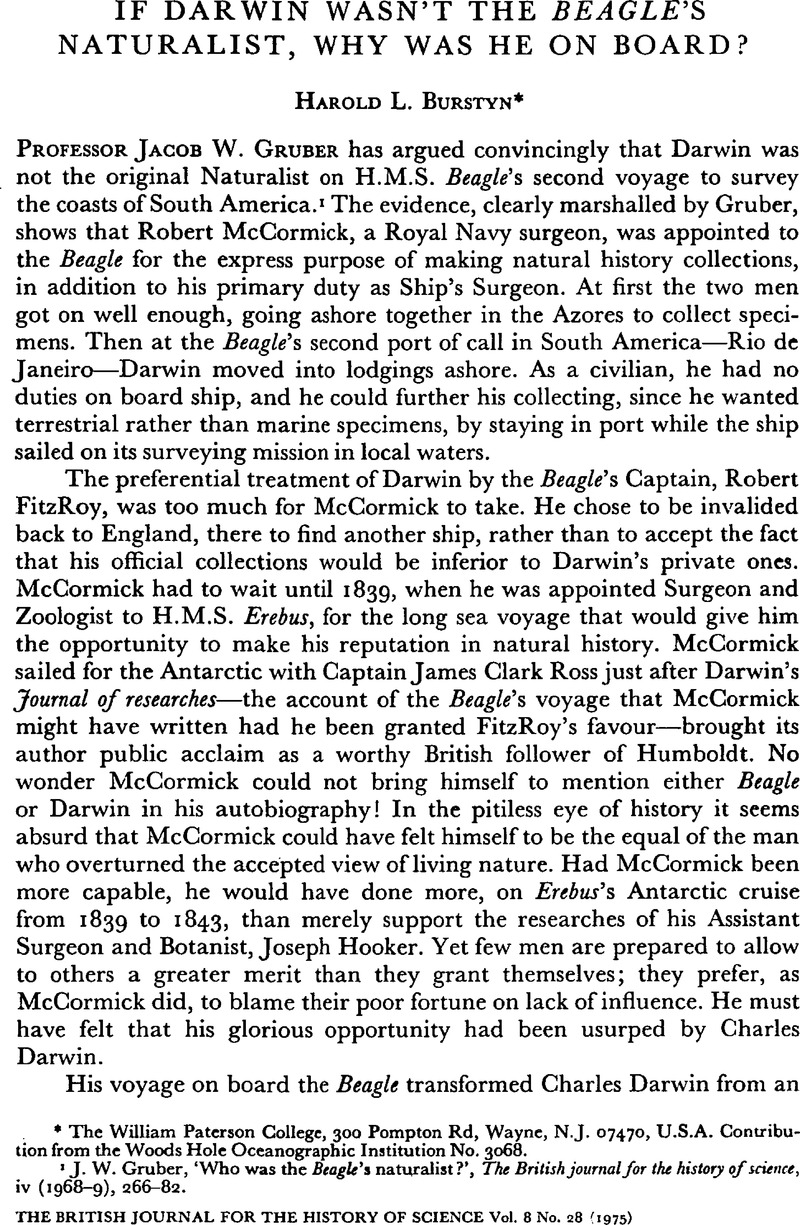Article contents
If Darwin wasn't the Beagle's Naturalist, why was he on Board?
Published online by Cambridge University Press: 05 January 2009
Abstract

- Type
- Presidential Address
- Information
- Copyright
- Copyright © British Society for the History of Science 1975
References
1 Gruber, J. W., ‘Who was the Beogle's naturalist?’, The British journal for the history of science, iv (1968–1969), 266–82.Google Scholar
2 Ibid., p. 266.
3 Fitz-Roy, Robert (ed.), Narrative of the surveying voyages of His Majesty's Ships Adventure and Beagle, between the years 1826 and 1836 (3 vols, in 4, London, 1839), vol. iGoogle Scholar. Though this first volume was written almost wholly by King, FitzRoy was the editor since King had emigrated to Australia. FitzRoy wrote volume ii and its Appendix; Darwin wrote volume iii, later the famous Journal of researches.
4 Ibid., i. 150–1. See also Ritchie, G. S., The Admiralty chart. British naval hydrography in tht nineteenth century (New York, 1967), pp. 178–9Google Scholar. Captain Owen Stanley, T. H. Huxley's commander in H.M.S. Rattlesnake, also took his own life rather than return to an arduous Pacific survey.
5 The words are those of FitzRoy's junior shipmate, B. J. Sulivan, as quoted in Mellersh, H. E. L., FitzRoy of the Beagle (London, 1968), p. 26.Google Scholar
6 Ibid., p. 63.
7 Bartlett, C. J., Castlercagh (London, 1966)CrossRefGoogle Scholar. In a letter to his sister about FitzRoy's break down in 1834, Darwin refers to FitzRoy ‘being aware of his hereditary predisposition’ to mental derangement; see Barlow, Nora (ed.), Charles Darwin and the voyage of tht Beagle (London, 1945), p. 110Google Scholar. See also the the text below at note 21.
8 FitzRoy, , op. cit. (3), ii. 18.Google Scholar
9 Barlow, Nora (ed.), Darwin and Henslow: the growth of an idea. Letters 1831–60 (Berkeley, 1967), p. 30.Google Scholar
10 Ibid., p. 35.
11 Ibid., p. 36.
12 Ibid., p. 33.
13 Quoted in full in Gruber, , op. cit. (i), pp. 273–4Google Scholar, from the original in the Sherborn Collection of the British Museum.
14 FitzRoy, , op. cit. (3), p. 19.Google Scholar
15 The Royal Society's Catalogue of scientific papers, i (London, 1868)Google Scholar, has one entry under ‘Chester’: John Chester's ‘Treatise on the pilchard’ published in the Transactions of the Cornwall Polytechnic Society for 1835. It seems unlikely that a friend of FitzRoy's would be associated with a minor provincial society. A search of the author files of the Hunt Institute for Botanical Documentation, at Carnegie-Mellon University, which are more complete for this period than is the Royal Society Catalogue, has yielded no Chester at all. The conventional interpretation, that FitzRoy invented a prior oner to put Darwin off, is based on the letter of 9 September 1831 from Darwin to his sister: ‘[FitzRoy] confesses his letter to Cambridge was to throw cold water on the scheme.’ Though Darwin may have thought that ‘Wood has been of the greatest use to me, and I am sure his personal introduction of me inclined Cap. Fitzroy to have me … Wood … solemnly warned Fitzroy that I was a Whig’ (Barlow, , op. cit. [7], pp. 46–7Google Scholar). Hence, conjectures Mellersh, Wood in fact did Darwin no service by writing, for FitzRoy's reply announcing the prior offer was a direct response to his learning that Darwin was a Whig (Mellersh, , op. cit. [5], p. 66Google Scholar). The nature of FitzRoy's offer to Chester—bona fide or invented—is not at issue here. Chester must have existed for his name to have been mentioned by FitzRoy; otherwise he would have left his friend nameless in the conversation with Darwin. That is, though FitzRoy may have invented the offer, the person to whom it was allegedly made had to be real for his name to be mentioned. Our question is then: was Chester a naturalist?; and our answer: not so far as we know.
16 Barlow, , op. cit. (7), p. 43Google Scholar. Perhaps FitzRoy's friend was Harry Chester (1806–68), novelist and youngest son of SirChester, Robert (1768–1848)Google Scholar of Bush Hall, Herts., in 1831 a clerk in the Privy Council Office; see Boase, Frederic, Modern English biography, i (London, 1892), col. 604.Google Scholar
17 FitzRoy, , op. cit. (3), ii. 18.Google Scholar
18 Barlow, Nora (ed.), Charles Darwin's diary of the voyage of H.M.S. ‘Beagle’ (Cambridge, 1934), p. 14.Google Scholar
19 Barlow, , op. cit. (7), pp. 57, 61.Google Scholar
20 Basalla, George, ‘The voyage of the Beagle without Darwin’, The mariner's mirror, xlix (1963), 42–8, especially note 19.CrossRefGoogle Scholar
21 Darwin's account (Barlow, , op. cit. [7], pp. 109–11Google Scholar) is fuller than FitzRoy's (op. cit. [3], ii. 361–2). Though his biographer calls FitzRoy ‘the eternal masochist [who] left out nothing that might show himself in a bad light’ (Mellersh, , op. cit. [5], p. 191Google Scholar), he could not bring himself to state in print that he had relinquished his command for a short while.
22 Gruber, , op. cit. (1), pp. 268, 270.Google Scholar
23 Mellersh, , op. cit. (5), p. 63.Google Scholar
24 de Beer, Gavin, Charles Darwin: a scientific biography (London, 1965), p. 56.Google Scholar
25 FitzRoy, , op. cit. (3), ii. 19.Google Scholar
26 Barlow, Nora (ed.), The autobiography of Charles Darwin (New York, 1959), p. 73.Google Scholar
27 Ibid., p. 75.
28 Barlow, , op. cit. (18), p. 17.Google Scholar
- 9
- Cited by


